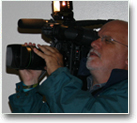 Trent University Professor James Conolly Awarded $868,000 in Two Collaborative Research Grants from UKFOR IMMEDIATE RELEASE New Funding To Help Archaeologists Understand Origins and Spread of Agriculture Monday, January 22, 2007, Peterborough Trent University Assistant Professor James Conolly has received two grants from the UK-based Arts and Humanities Research Council totalling $868,000 to support his collaborative research that explores why ancient human societies chose farming over hunter-gatherer lifestyles. The first grant of $800,000 (£380,249) was awarded to Dr Conolly, Professor Stephen Shennan of University College London (UCL) and Dr Keith Dobney of the University of Durham, to study the spread of animal domestication across Europe and southwest Asia from 10,000 B.C. to 5,000 B.C. Specifically, this project involves cataloguing faunal evidence, such as the remains of pigs, cattle, goats and sheep, from hundreds of archaeological sites into one master database and linking this data to digital maps of the continent. This will allow them to interrogate and interpret the different patterns and rates of spread of domestic animals across Europe. When this project is completed four years from now, this database will be made publicly accessible to other researchers interested in the history of agriculture. This study follows a very similar archaeobotanical project conducted by Dr. Conolly, Professor Shennan and Dr. Sue Colledge of UCL where they created a mappable database depicting the spread of plant domestication. According to Prof. Conolly, the gradual replacement of hunting and gathering by farming is seen by some academics as “humanity’s greatest mistake”. “Agriculture is clearly a less attractive mode of living than the hunter-gatherer lifestyles that it replaced,” explained Prof. Conolly. “The earliest farmers experienced a rise in pathologies and shortening of lifespan associated with a less varied diet, higher population densities, and a massive increase in social conflict and interpersonal violence. A major question is thus to understand how and why it spread so quickly”. Through this new study into the origins of pastoralism, Prof. Conolly will also be looking at human-animal relationships, especially the ideologies that supported animal domestication in ancient societies. In a related project, Prof. Conolly’s second research award, valued at $68,400 (£32,500), will support his collaboration with Dr Andrew Bevan of UCL to study the agricultural history of Antikythera, a remote island of Greece. They will be examining the ancient remains of agricultural terraces built over the last 5,000 years to determine the underlying causes of agricultural intensification related to demographic pressure. Prof. Conolly was very pleased upon learning the news of these significant awards. “I like looking at continental processes. There’s enough data from the vast number of archaeological excavations that we can now meaningfully address large-scale questions. The huge intellectual challenge is to bring the site information together in a meaningful way.” This research is a continuation of Prof. Conolly’s current archaeological fieldwork based out of Trent University and funded by the Social Sciences and Humanities Research Council of Canada. Prof. Conolly joined Trent in 2004 as a Canada Research Chair in Archaeology where he applies GIS, remote sensing and agent-based modelling (ABM) to archaeological data to understand patterns in long-term human behaviour. One of Canada's top universities, Trent University is renowned for striking a unique balance between outstanding teaching and leading-edge research. The University is consistently recognized nationally for faculty who maintain a high level of innovative research activity and a deep commitment to the individual student. Distinguished by excellence in the humanities, social sciences and natural sciences and increasingly popular professional and graduate programs, Trent is dedicated to providing its students with an exceptional world view, producing graduates who are ready to succeed and make a difference in the world. Trent's Peterborough campus boasts award-winning architecture in a breathtaking natural setting on the banks of the Otonabee River. Together with its satellite campus in Oshawa, Trent draws excellent students from throughout the country and around the world. -30- For further information, please contact: |
































